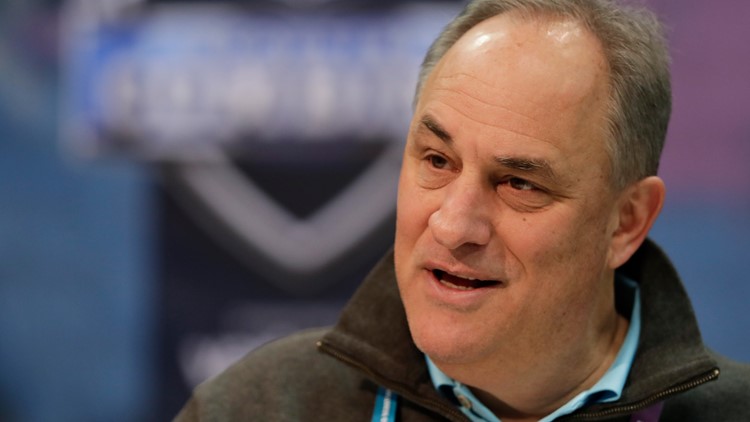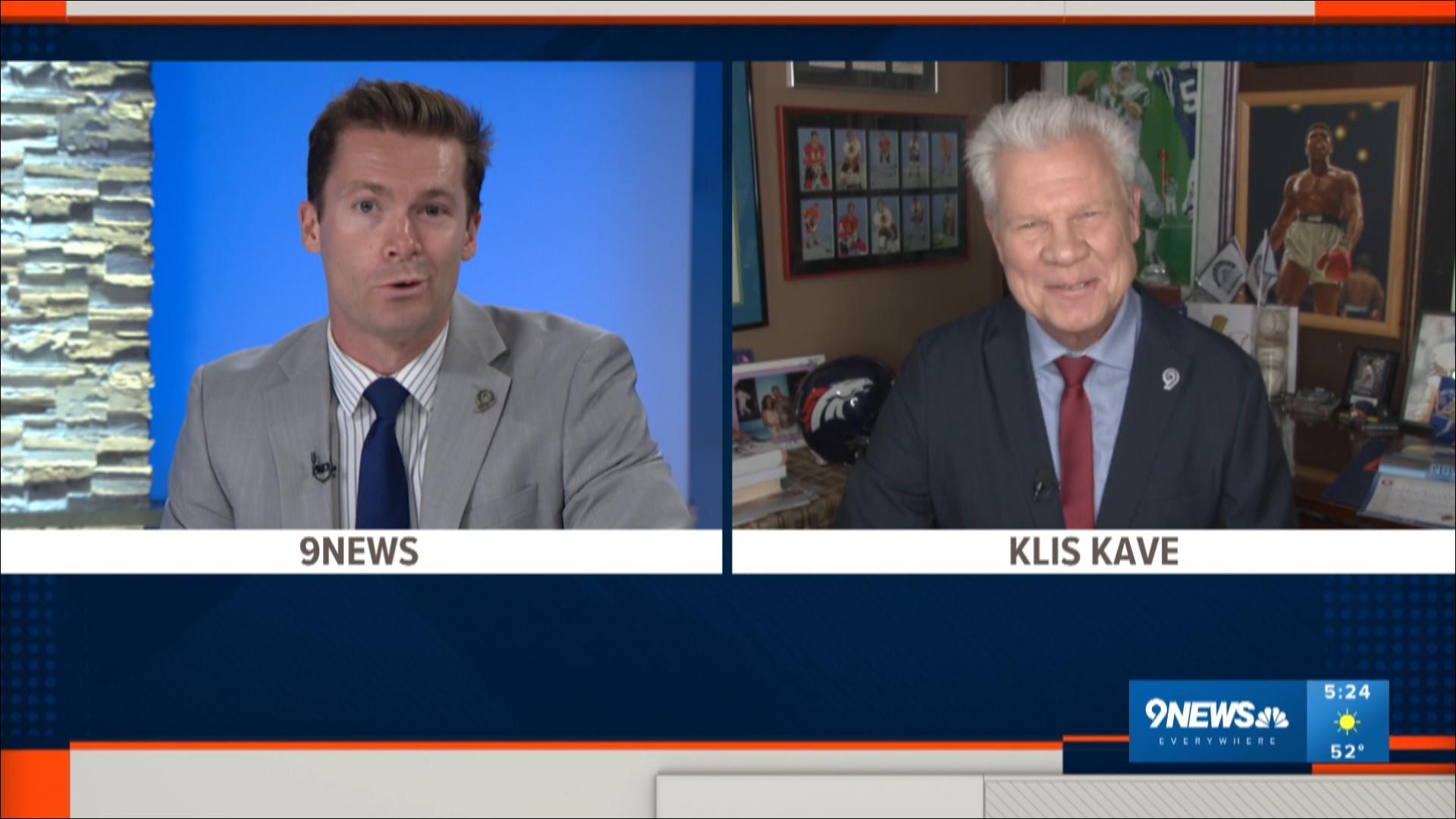INDIANAPOLIS – In the seven weeks since he was hired as the Broncos’ new head coach, Vic Fangio has settled into a routine.
He is usually either at the south Denver-area hotel where he lives, or, more often, at the Broncos’ UCHealth Training Center’s head coaching office.
Some lives settle in a little differently than others. At least Fangio has found a few Italian restaurants he likes.
“Big Bill’s New York Pizza,’’ he said. “I like that for my pizza spot. There are some others.’’
In a sit-down interview with 9News here Wednesday as part of the NFL Combine, Fangio addressed far more pertinent subjects regarding the Denver Broncos’ plan to improve on their 5-11 and 6-10 records from their two previous years under coach Vance Joseph.
Denver’s defensive players should know this: No two 3-4 systems are alike. The Broncos have employed a 3-4 system since 2015. Fangio has been one of the league’s 3-4 gurus for several years, most notably last year as the commander of the Chicago Bears’ No. 1 ranked scoring defense (17.7 points per game).
“The way we played the last couple of years in Chicago was a lot different than the way the Broncos have played the last couple years,’’ Fangio said. “The Broncos played a lot of man, and a lot of 5-man rush man. We didn’t play too much of that in Chicago the past couple years. Especially this past year. We were more zone-oriented on first and second down than they were in Denver.
“Third down was more of a 50-50 mix for us. And the way we played was a lot different.’’
When a defense is playing well, it can trick the eye test. It can swarm so many players to the ball, and bring so much pressure on the quarterback, a defense can look like it has 13 players on the field instead of 11.
The Broncos played with that type of gang-tackling approach under Wade Phillips during their Super Bowl season of 2015. The Bears had that look in 2018.
“Hopefully we can make you have that same feeling watching us this coming year,’’ Fangio said. “But we want to be a swarming defense. All the good ones are. And we want to be a great tackling defense. All the good ones are. We want to create takeaways. And we need to do all of that to get back to where we need to be.’’
Other topics Fangio addressed:
*Gary Kubiak. Fangio nor general manager John Elway had ever publicly discussed the breakup between the Broncos and their presumed offensive coordinator.
“I think it was more of an assumption made by everybody at the time that’s what was going to happen, when in actuality that was never agreed to,’’ Fangio said. “It was a possibility for it to happen and we did talk about it. It just didn’t happen.’’
(9News has reported the breakup was over Kubiak’s insistence on having assistants Rick Dennison and Brian Pariani teach his running game. The Broncos did not retain those two assistants after Kubiak resigned for health reasons following the 2016 season and the team didn’t want them back in 2019.)
*Fangio’s coaching staff mix. There is vast experience at many of his assistant coaching positions (Mike Munchak, Ed Donatell, Bill Kollar, Reggie Herring, Wade Harman) yet inexperience with Rich Scangarello, who will be a first-time offensive coordinator, and T.C. McCartney, a first-time quarterbacks’ coach.
“Rich, I think, prepared himself well in his coaching journey to have this opportunity,’’ Fangio said. “He’s worked with good offenses in the NFL with good people. He worked calling plays in college football for eight or nine years.
“I think he’s ready for it. I have a lot of confidence in him. I think he illustrated his teaching and coaching during his stay with the 49ers. I expect that to continue. Rich will be working a lot with our quarterbacks, also.’’
*The new (and former) offensive system. The Broncos will return to the zone blocking, one-cut running game the franchise made famous during the Alex Gibbs-Mike Shanahan era in the late-1990s. With some wrinkles.
Scangarello is a disciple of 49ers head coach Kyle Shanahan, who was groomed by both his dad and Kubiak. As a defensive-oriented head coach, Fangio likes the offensive system.
“They do a good job of marrying the run game with the play-action game and it can create conflict to the defense,’’ Fangio said. “Which is a good place to start. If you can run the ball effectively, the play-action pass offers a great opportunity to get the big chunk plays. And that’s where the games are won and lost: Can you get the 20, 25-or-more yard plays consistently throughout the season.’’
*Emmanuel Sanders. There wasn’t much doubt the Broncos’ best receiver would return – until there was speculation recently about him agreeing to take a pay cut from his $10.25 million payout this season.
Sanders, who will soon turn 32, is coming off Achilles surgery. Sanders himself started wondering about his status in recent social media posts.
Fangio was asked role Sanders would play during his formal combine press conference with 22 media members from Denver plus a dozen or two more from other outlets.
“Hopefully, it’ll be a major role for us,’’ he said. “Emmanuel’s a hell of a player, been a highly productive receiver in the league for a long time. He was having an excellent year last year with the Broncos. We expect him to be back full speed.”
*The roster. Fangio spent a couple weeks evaluating the Broncos roster he inherited. His thoughts?
“I like that there’s a good nucleus of young players that started last year with last year’s draft and possibly the year before,’’ he said. “It’s now bridging the gap between the Super Bowl team and where the franchise needs to get back to.
“There are some good young players there, yet there are still some veterans who are in the prime of their careers like Von Miller, Chris Harris, Emmanuel Sanders. Some other guys, too -- I don’t want to miss anybody. I just think there’s good youth and guys in the middle parts of their careers.’’
*Does he need more speed on defense?
“You always could use more speed, but I think we could use some more speed, yes,’’ he said.
*Coaching players -- and coaching men. Finally, Fangio is the type who won’t use six words when two will do. His firm, straightforward approach has worked while coaching at high school (Dunmore, Penn., his alma mater, and Milford, Conn.), college (North Carolina and Stanford) and NFL (assistant coaching gigs with the Saints, Panthers, Colts, Texans, Ravens, 49ers and Bears).
The difference between coaching high school kids, college student-athletes and professionals?
“You know, not as much as you’d think,’’ he said. “Obviously, there’s different maturity levels. When you’re coaching at the college level, the players only experience in coaching is their high school coaches. In college you maybe get a little more of a free pass that the players will listen to you just because you’re the coach.
“Whereas now when you get them in pro football they’ve had their high school coaches, they’ve had their college coaches and maybe they’ve had another team or two in the NFL. So they’re more experienced and it’s hard to fool the players there. You’ve got to be on top of your game as a coach in the NFL.
“But also I think -- you know, I’ve talked to college coaches a lot and they want to talk football. And sometimes they’ll give you the excuse, “Well, our players can’t learn that.’’ And I’ll make them aware that we get our players from college football. They didn’t get a brain transplant between then and now. Stop using that as a crutch when you try and teach them something.’’
There is Xs and Os coaching, there is getting the players motivated to play on Sunday. And there is using the platform of an authority figure to guide them as men on a personal level. And helping young men grow is not restricted to the high school or college levels.
“You know I try to do it in the NFL, too,’’ Fangio said. “Just because you become 21 or older doesn’t mean there’s a lot of difference between being 19 or 20. So I try to do that in the pros, too.’’



